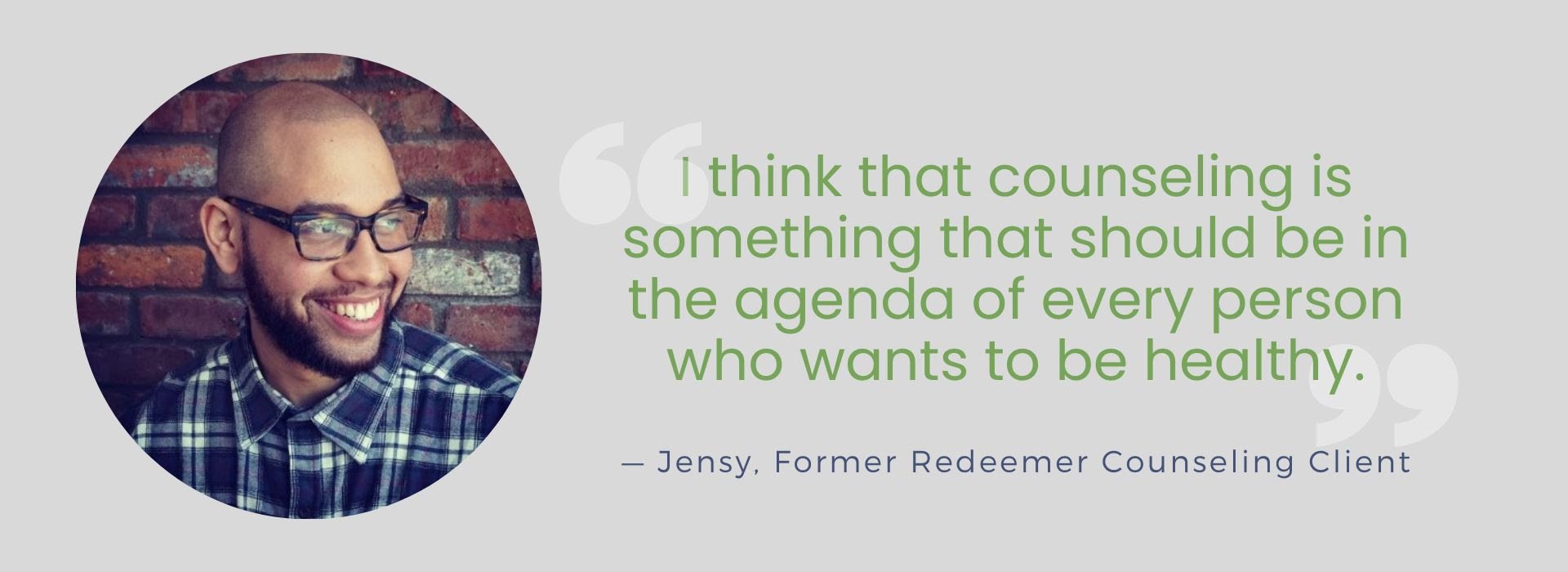Is Forgiving the Same as Trusting?
Spring 2023 Update
Letter from Redeemer Counseling’s Director of Development, Cindy Lee
In my time here, I have had the privilege of connecting with our supporters and learned about their motivations for giving to Redeemer Counseling. Some have received help here and want to help others. Others witnessed their loved ones changed by their healing journey here or gave because they used to work here and want to ensure this ministry continues. And there are those who have little direct experience of our work but who want to make mental health accessible to all people here.
As you may know, 2022 was the second year of our financial independence from Redeemer Presbyterian Church. We needed to become self-sustaining because we have grown to serve the NY tristate area. We receive referrals for 1:1 counseling and training workshops from over 95 churches and organizations. The need and thirst for healing continues to grow and it is becoming evident that Redeemer Counseling has a large role to play in this story.
Grateful,
Cindy Lee
Director of Development
Redeemer Counseling
Kate Glerup. Ph.D., Supervisor and Counselor
Is forgiveness the same as trusting someone else? If we forgive, does that guarantee reconciliation? The simple answer is no. Forgiveness can be hard to understand. In dictionary.com, there are twenty different words related to forgiveness such as absolution, indemnity, and justification. The good news is that, today, we are not focusing on what forgiveness is but on what forgiveness is not, which is much more manageable. With a better understanding of what forgiveness is NOT, we can grow in the understanding of God's intent for forgiveness and the potential impact of forgiveness within our family.
In the message of the Gospel, Jesus extended forgiveness to us, even before we acknowledged what we did. The experience of receiving that kind of forgiveness will enable us to forgive those who have hurt us. That is how we live out the Gospel. Forgiveness does not mean that we are then required to trust people.
Real forgiveness is “a willingness to abandon one’s right to resentment, negative judgment and indifferent behavior toward one who unjustly injured us, while fostering the undeserved qualities of compassion, generosity and even lovetoward him or her.” (Dr. Robert Enright of the International Forgiveness Institute)
Forgiveness is NOT:
Forgetting the hurt: This idea of ‘forgive and forget’ is actually a really bad idea. In the family, that looks like denial. Denial is usually not a healthy response to any hurt or rupture in most relationships. Forgiveness does not mean that the memory of the event or the feelings associated with the event are just erased! The memory remains but has the additional context of forgiveness.
Condoning or excusing the behavior. Forgiveness is not enabling the behavior, especially when it comes to your family. It is saying the behavior is wrong and you forgive that person for the behavior, but it needs to change. “If you allow someone to take advantage of you, you’re enabling this behavior and are part of the problem. God says that if we don’t confront someone in sin, we share in the liability of the issue. (See Lev. 19:17.) You are to confront sin in others by calling attention to it and taking a stand against it. (See Matt. 18:15-18.)” (Dr. Henry Cloud)
Reconciling the relationship. You can choose to forgive someone without choosing to reconcile the relationship. Reconciliation requires two people, forgiveness requires one. Reconciliation needs two people willing to work together to change and rebuild trust. It is often not wise or healthy to reconcile if the individual continues behavior that is unsafe, such as emotional, physical or verbal abuse. These principles apply to family as well. For example, when Child Protective Services removes a child from the custody of an abusive parent, the parent can lose their parental rights if they do not change. Blood and genetic connection does not guarantee connection or relationships in families—at any age.
Trusting the person. As mentioned with reconciliation, you can choose to forgive a person without trusting that person. Trust and forgiveness are two different things. If trust is broken within a family system, it must be restored through changed behavior. For example, you can forgive a parent for abusing alcohol and driving with you while drunk when you were a child. But as an adult with children of your own, would you trust your own child to be in a car with that parent? You may not, especially if they had done absolutely nothing to show you that they had addressed their problem drinking. Even Jesus did not trust everyone, as we see in John 2:24, “But Jesus would not entrust himself to them, for he knew all people.”
EASY! Especially when it comes to family! The people closest to us can hurt us the most, but we also have the most to lose if we don’t forgive or be willing to reconcile. But with God’s help, anything is possible.
The following resources could also be helpful in this journey of forgiveness and trust:
SEP 2018 Toolkit: Doing The Hard Work Of Forgiveness, Judy Cha
Forgive: Why Should I and How Can I? by Tim Keller
Meet Jensy, a Professor in Pastoral Ministry at Alliance University
Jensy, please introduce yourself.
I am a professor at Alliance University in the biblical studies department and in the pastoral ministry department. I am also a regional manager through Lead NYC and CarePortal here in New York City.
Has counseling helped you balance your ministry life?
Absolutely yeah. I often tell people that we take care of our spirit through church, we take care of our bodies, through the gym, but we don’t do anything for our souls. I think that counseling is something that should be in the agenda of every person that wants to be healthy. If I’m able to exercise the things of the Spirit at church and I am able to exercise my physical body in a gym, what am I doing to exercise my soul? Having that component of counseling has really helped me to understand where some of the hangups I have in life, some of the things that I am processing, some of the things that I have experienced in life, where they come from. It helps me to mitigate those types of situations in everyday life.
JENSY CONTINUED: Counseling really does help identify root causes of triggers and what happens in relational schisms or relational drama. It has helped me to understand myself, even things that I experienced that were painful to me. I didn’t hear, “Hey, you know what? What you experienced was terrible. I’m sorry you experienced that.” That affirmation that I’m not crazy for experiencing what I experienced: it’s huge. Being able to speak about it in a safe space helped me understand that these feelings were valid. It also helped me to gain perspective on different things that I have experienced and put them in the right places.
Every pastor, every ministry leader needs to be in counseling. Counseling is a way to remain healthy. It is a way to stay healthy. It is a way to exercise the soul.
Anything else you want to add about your time at Redeemer Counseling?
There was a time when I was in need of Redeemer Counseling's sliding scale. If there is any way that scale can be bolstered, that's great—because there are many people who are in desperate need of Christian counseling that cannot afford it. Even though that’s not where I find myself currently, it’s important for me to be an advocate for people like me that needed counseling at the time but could not afford it. I am really grateful. I think that counseling and the sliding scale are absolutely necessary and I hope that more ministers would sign up for counseling.
Your gifts to Redeemer Counseling Services ensure that more people and communities receive professional, Gospel-centered mental health care and training.
90% of our client sessions are supported through donations.
43% of clients have a household income under $50,000.
These clients include working families, people who have lost jobs, college students, artists, people who are faced with personal crises or debilitating illnesses.





